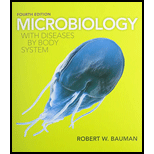
Microbiology with Diseases by Body System & Modified MasteringMicrobiology with Pearson eText -- ValuePack Access Card -- for Microbiology with Diseases by Body System Package
1st Edition
ISBN: 9780133857122
Author: Robert W. Bauman Ph.D.
Publisher: PEARSON
expand_more
expand_more
format_list_bulleted
Concept explainers
Question
Chapter 11, Problem 5SA
Summary Introduction
To answer:
Compare and contrast bacterial and archaeal cells.
Introduction:
Prokaryotes are single-celled microorganisms that lack membrane-bound organelles or a nucleus. Bacteria are prokaryotic microorganisms. All organisms are categorized into three domains. They are archaea, eukarya, and bacteria. Archaea are extremophiles that replicate by means of budding and binary fission. It appear in different shapes, such as pleomorphic, bacilli, and cocci.
Expert Solution & Answer
Want to see the full answer?
Check out a sample textbook solution
Students have asked these similar questions
Compare and contrast bacterial and archaeal cell wall
Create an artwork portraying the prokaryotic cell (one for archaea and one for bacteria). Explain the artwork in detail.
Describe a prokaryotic cell in depth and give an example of an organism that is made of prokaryotic cells.
Chapter 11 Solutions
Microbiology with Diseases by Body System & Modified MasteringMicrobiology with Pearson eText -- ValuePack Access Card -- for Microbiology with Diseases by Body System Package
Ch. 11 - Prob. 1TMWCh. 11 - Why are taxonomic names and categories in our...Ch. 11 - Prob. 3TMWCh. 11 - Prob. 1EDCSCh. 11 - Why are bacteria all classified in the same domain...Ch. 11 - Modified True/False 1. ____ All prokaryotes...Ch. 11 - Prob. 2MTFCh. 11 - Modified True/False 3. __________ If you were to...Ch. 11 - Prob. 4MTFCh. 11 - Prob. 5MTF
Ch. 11 - Modified True/False 6. __________ Halophiles...Ch. 11 - Prob. 7MTFCh. 11 - Prob. 8MTFCh. 11 - Modified True/False 9. A giant bacterium that is...Ch. 11 - Prob. 10MTFCh. 11 - Prob. 1MCCh. 11 - Prob. 2MCCh. 11 - Prob. 3MCCh. 11 - Endospores _____. a. remain alive for decades b....Ch. 11 - Prob. 5MCCh. 11 - Prob. 6MCCh. 11 - Prob. 7MCCh. 11 - Prob. 8MCCh. 11 - Prob. 9MCCh. 11 - The presence of mycolic acid in the cell wall...Ch. 11 - Match the bacterium on the left with the term with...Ch. 11 - Whereas the first edition of Bergeys Manual relied...Ch. 11 - What are extremophiles? Describe two kinds, and...Ch. 11 - Name and describe three types of bacteria...Ch. 11 - Prob. 4SACh. 11 - Prob. 5SACh. 11 - A student was memorizing the arrangements of...Ch. 11 - Prob. 7SACh. 11 - Name and describe five distinct classes of phylum...Ch. 11 - Prob. 9SACh. 11 - Prob. 10SACh. 11 - Prob. 1VICh. 11 - Prob. 2VICh. 11 - A microbiology student described deeply branching...Ch. 11 - Prob. 2CTCh. 11 - Prob. 3CTCh. 11 - Prob. 4CTCh. 11 - Louis Pasteur said, The role of the infinitely...Ch. 11 - Prob. 6CTCh. 11 - A scientist who discovers a prokaryote living in a...Ch. 11 - Contrast the processes of nitrogen fixation and...Ch. 11 - Prob. 9CTCh. 11 - Using the following terms, fill in the following...
Knowledge Booster
Learn more about
Need a deep-dive on the concept behind this application? Look no further. Learn more about this topic, biology and related others by exploring similar questions and additional content below.Similar questions
- Describe the three major domains of life: Archaea, Bacteria, and Eukarya. Explain what the three domains have in common and how they differ. Define viruses, and explain how they relate to living cells. Explain how microbial diseases have changed human history. Explain the tenets of Cell Theory Describe how microscopy led to the Germ Theory of infectious disease Define the germ theory of disease. Explain how Koch's postulates can show that a specific kind of microbe causes a disease. Explain the problems in interpreting Koch's postulates in practice.arrow_forwardDifferentiate gram-positive and gram-negative bacteria based on their cell wall structurearrow_forwardBacteria, Archaea, and Eukarya are three _____.arrow_forward
- Describe a eukaryotic cell in-depth and give an example of an organism that is made of eukaryotic cells.arrow_forwardIndicate whether the following structures occur in Bacteria, Eukarya or both. Also indicate one function for the structure. 1 ) Ribosomes2) Nucleus3) Cell wall4) Flagella5) Fimbriaearrow_forwardCompare and contrast prokaryotes and eukaryotes.arrow_forward
arrow_back_ios
SEE MORE QUESTIONS
arrow_forward_ios
Recommended textbooks for you
 Comprehensive Medical Assisting: Administrative a...NursingISBN:9781305964792Author:Wilburta Q. Lindh, Carol D. Tamparo, Barbara M. Dahl, Julie Morris, Cindy CorreaPublisher:Cengage Learning
Comprehensive Medical Assisting: Administrative a...NursingISBN:9781305964792Author:Wilburta Q. Lindh, Carol D. Tamparo, Barbara M. Dahl, Julie Morris, Cindy CorreaPublisher:Cengage Learning Biology Today and Tomorrow without Physiology (Mi...BiologyISBN:9781305117396Author:Cecie Starr, Christine Evers, Lisa StarrPublisher:Cengage Learning
Biology Today and Tomorrow without Physiology (Mi...BiologyISBN:9781305117396Author:Cecie Starr, Christine Evers, Lisa StarrPublisher:Cengage Learning

Comprehensive Medical Assisting: Administrative a...
Nursing
ISBN:9781305964792
Author:Wilburta Q. Lindh, Carol D. Tamparo, Barbara M. Dahl, Julie Morris, Cindy Correa
Publisher:Cengage Learning

Biology Today and Tomorrow without Physiology (Mi...
Biology
ISBN:9781305117396
Author:Cecie Starr, Christine Evers, Lisa Starr
Publisher:Cengage Learning

Bacterial Structure and Functions; Author: Osmosis;https://www.youtube.com/watch?v=b15Hy3jCPDs;License: Standard youtube license